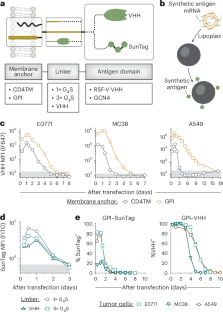2025-05-27 ジョージア工科大学
<関連情報>
- https://research.gatech.edu/painting-target-cancer-make-therapy-more-effective
- https://coe.gatech.edu/news/2025/05/painting-target-cancer-make-therapy-more-effective
- https://www.nature.com/articles/s43018-025-00968-5
合成抗原の脂質ナノ粒子送達によるCAR媒介細胞毒性への固形腫瘍の感作 Sensitizing solid tumors to CAR-mediated cytotoxicity by lipid nanoparticle delivery of synthetic antigens
Lena Gamboa,Ali H. Zamat,Chloé A. Thiveaud,Hee Jun Lee,Elif Kulaksizoglu,Zizhen Zha,Noah S. Campbell,Ching Shen Chan,Sydney Fábrega,S. Abbey Oliver,Fang-Yi Su,Hathaichanok Phuengkham,Daryll Vanover,Hannah E. Peck,Anirudh Sivakumar,Shreyas N. Dahotre,Adrian M. Harris,Philip J. Santangelo & Gabriel A. Kwong
Nature Cancer Published:16 May 2025
DOI:https://doi.org/10.1038/s43018-025-00968-5

Abstract
Chimeric antigen receptor (CAR) T cell immunotherapy relies on CAR targeting of tumor-associated antigens; however, heterogenous antigen expression, interpatient variation and off-tumor expression by healthy cells remain barriers. Here we develop synthetic antigens to sensitize solid tumors for recognition and elimination by CAR T cells. Unlike tumor-associated antigens, we design synthetic antigens that are orthogonal to endogenous proteins to eliminate off-tumor targeting and that have a small genetic footprint to facilitate efficient tumor delivery to tumors by lipid nanoparticles. Using a camelid single-domain antibody (VHH) as a synthetic antigen, we show that adoptive transfer of anti-VHH CAR T cells to female mice bearing VHH-expressing tumors reduced tumor burden in multiple syngeneic and xenograft models of cancer, improved survival, induced epitope spread, protected against tumor rechallenge and mitigated antigen escape in heterogenous tumors. Our work supports the in situ delivery of synthetic antigens to treat antigen-low or antigen-negative tumors with CAR T cells.

